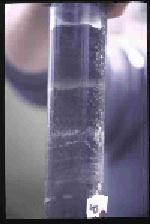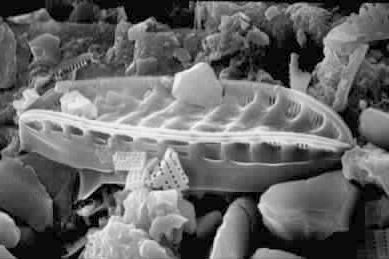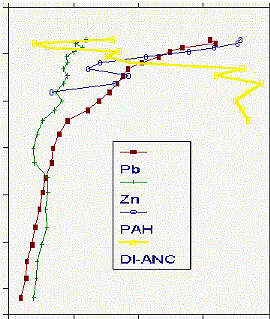The Paleolimnology Home Page
Biology Department, Indiana University
 Welcome to the paleolimnology home page, intended as a central
Web resource for those interested in and/or practicing paleolimnology. This
page contains information of general interest to paleolimnologists and links
to other useful Internet resources. Most of the information is downloaded
from postings to various LISTSERVers. Please contact me at the address at
the bottom of the page with information, links, or other contributions you
would like to share with the community.
Welcome to the paleolimnology home page, intended as a central
Web resource for those interested in and/or practicing paleolimnology. This
page contains information of general interest to paleolimnologists and links
to other useful Internet resources. Most of the information is downloaded
from postings to various LISTSERVers. Please contact me at the address at
the bottom of the page with information, links, or other contributions you
would like to share with the community.
P. Roger Sweets
Last updated: 1 May, 1997
Contents:
Paleolimnology
Paleolimnology is the study of past freshwater, saline, and brackish
environments. In some cases, the history of the water body itself is important,
but typically information is used in a wider geographical and ecological
context.
 Often a core is taken from the sediments
of a limnological system, and the fossils, geological and chemical signals
that are preserved in the core are the clues to revealing the ecological
history of the lake and the surrounding landscape.
Often a core is taken from the sediments
of a limnological system, and the fossils, geological and chemical signals
that are preserved in the core are the clues to revealing the ecological
history of the lake and the surrounding landscape.
 These clues can often result
in quantitative and qualitative reconstructions of important lake chemistry
and biology.
These clues can often result
in quantitative and qualitative reconstructions of important lake chemistry
and biology. 
And that is a small part of the story!
as posted to the LISTSERVs
Meetings
The Canadian
Association of Palynologists has an excellent meeting list.
Archaeometry and Archaeology meetings are listed by the
Society for Archaeological
Sciences
-
The 1997 Joint Annual Meeting of the
Geological Association and Mineralogical Associations of Canada
-
Ottawa, Ontario; May 19-21, 1997
-
-
Canadian Quaternary
Association, 8th Biennial Meeting
-
Montreal, Quebec; May 22-24, 1997
-
-
1st International Conference on Applications of
Micropaleontology in Environmental Sciences
-
Hosted by the The Porter Super-Center for Ecological and Environmental Studies
and Institute for Nature Conservation Research, Tel Aviv University, Tel
Aviv, Israel; 9-13 June 1997
-
International Geological
Correlation Programme (IGCP) Project no. 396 'Continental Shelves in
the Quaternary'
-
VENUE - University of Durham, UK; 20-24th July, 1997
-
-
Canadian Association of Geographers
(they are having some paleo applicable sessions)
-
Memorial University of Newfoundland (St. John's) August 19-24, 1997
-
-
The 7th International Symposium on Palaeolimnology
-
Heiligkreuztal/Riedlingen, Germany; 28th Aug.-2nd Sept. 1997
-
UNESCO IGCP Project 335
"Biotic Recoveries
from Mass Extinctions"
-
Prague, Czech Republic, September 12-14, 1997
-
-
The INQUA-Subcommission on European Quaternary
Stratigraphy
-
The Late Pleistocene in Eastern Europe: Stratigraphy, palaeoenvironment and
climate;
Vilnius (Lithuania); September 14-19, 1997
-
Palynostratigraphy at Low Latitudes
-
Porlamar Venezuela; 16-19 November, 1997.
-
-
Royal Geographical Society
with the Institute of British Geographers,
-
Kingston University, Kingston, UK; January 5th - 8th, 1998
-
The Geological and
Mineralogical Associations of Canada
-
Laval University, Quebec City, Canada; May 18-21, 1998
-
XV INQUA 1999 Congress
-
Durban, South Africa; 3-11 August 1999
-
-
-
-
Courses & Educational Opportunities
-
The Environmental
Change Research Centre at University College London has many first rate
courses for MSc or PhD students in palaeoecology, environmental archaeology
or other areas of environmental science.
Geography of the West Field Camp: Basin & Range;
23 June-20 July 1997
-
Central Washington University
-
-
Don't forget the yearly summer courses on diatoms. Info can be found on my
Diatom
home page
Colleges with paleo opportunities
most of these have interesting information on paleoecological topics in general
-
The American Quaternary
Association or AMQUA (includes a directory of N.Am. Quaternary
Scientists)
-
American Association of
Stratigraphic Palynologists
-
The Australasian Quaternary Association
-
Canadian Quaternary Association
-
Canadian Association
of Palynologists
-
The International Union for Quaternary
Research or INQUA
-
The Irish Association for
Quaternary Studies (IQUA)
Society for Archaeological
Sciences
-
Southeast (U.S.) Friends
of the Pleistocene. The various FOP groups host frequent field trips.
-
The Quaternary Research Association (UK)
Great sources for notes about subscription, submission, and journal indices.
If you are unfamiliar with LISTSERVers, you can access a brief
list of commands. There is a
WWW home page for
LISTSERVers as well. The following LISTSERVers may be of interest to
paleolimnologists:
-
PALEOLIM
-
Subscribe at listserv@nervm.nerdc.ufl.edu
-
QUATERNARY
-
Subscribe at listserv@morgan.ucs.mun.ca. You can now access
archives of the QUATERNARY list.
-
MICROPAL
-
Subscribe at listproc@ucmp1.berkeley.edu
This is a new address for this list.
-
ISOGEOCHEM
-
Subscribe at listproc@moose.uvm.edu
-
POLLEN-SWEDEN
-
Subscribe at mailserv@nrm.se
-
C14-L
-
Subscribe at listserv@listserv.arizona.edu
-
FAUNMAP-L Web site
-
Subscribe to the list at Majordomo@museum.state.il.us
-
SITKA
-
Subscribe to the list at listproc@sunbird.usd.edu
-
ARCHAEOBOTANY
-
Subscribe to the list at listproc@eng-h.gov.uk
-
IAG-GEOMORPHLIST
-
GEOCOSMO
-
Subscribe to the list at listproc@list.uvm.edu
-
NWEUROPE-10KBP
-
Subscribe to the list at mailbase@mailbase.ac.uk
-
The Quaternary Page
-
Probably the most comprehensive list of paleo related Web sites.
-
INQUA File Boutique
-
Louis Maher's indispensable page for a lot of good paleo information, including
downloadable programs, mostly concerned with data-handling. Includes copies
of his Newsletter on Data Handling Methods. The ftp address is:
geology.wisc.edu/pub/inqua
-
World Data Center-A
-
Holds the
North
American Pollen Database as well as the rest of the NOAA/NGDC
Paleoclimatology Program data. Also, truly outstanding free programs
such as SiteSeer, ShowTime, MapPad, and the astounding
'PaleoVu'. These programs provide graphical representations in space
and time of all the various kinds of paleo data held by the NGDC. A must
stop on the PaleoCyberTour. Substitute the term 'gopher' or 'ftp' for 'www'
to access other Internet avenues.
-
The Institute for Arctic and Alpine
Research (out of Univ. of Colorado at Boulder) now has a fine Web page.
-
The INQUA Commission on Glaciation
-
Faunmap
-
Faunmap is an electronic database of mammal species during the last 40,000
years in the United States. It has been developed at the Illinois State Museum.
-
Australian
National University Palynology and Paleoclimatology
-
A Paleoatlas and literature
review
-
Brought to you by the INQUA Commission on Land Carbon.
-
Canadian Association
of Palynologists
-
CAP's excellent Web Page has many available resources including meeting lists
and more useful Web pages.
-
Oak Ridge Data Archive
-
The Oak Ridge National Laboratory (ORNL) Distributed Active Archive Center
(DAAC) is one of nine DAACs sponsored by NASA as part of the Earth Observing
System Data and Information System (EOSDIS). They focus on biogeochemical
dynamics and ecological data based on field measurements.
-
The BUGS database
*NEW*
-
A draft of the BUGS database, which includes the greater part of the North
European Lateglacial and Holocene record, is available from the Sheffield
ftp. This includes Excel files and Access database stuff...
-
Late Quaternary Sea
Level *NEW*
-
from the USGS
New or updated!
Jump back to the
Diatom Page


Last updated: 1 May, 1997
URL: http://www.indiana.edu/~diatom/paleo.html
Page design and comments: P. Roger
Sweets
Copyright 1995,
The Trustees of Indiana
University
 Welcome to the paleolimnology home page, intended as a central
Web resource for those interested in and/or practicing paleolimnology. This
page contains information of general interest to paleolimnologists and links
to other useful Internet resources. Most of the information is downloaded
from postings to various LISTSERVers. Please contact me at the address at
the bottom of the page with information, links, or other contributions you
would like to share with the community.
Welcome to the paleolimnology home page, intended as a central
Web resource for those interested in and/or practicing paleolimnology. This
page contains information of general interest to paleolimnologists and links
to other useful Internet resources. Most of the information is downloaded
from postings to various LISTSERVers. Please contact me at the address at
the bottom of the page with information, links, or other contributions you
would like to share with the community. Often a core is taken from the sediments
of a limnological system, and the fossils, geological and chemical signals
that are preserved in the core are the clues to revealing the ecological
history of the lake and the surrounding landscape.
Often a core is taken from the sediments
of a limnological system, and the fossils, geological and chemical signals
that are preserved in the core are the clues to revealing the ecological
history of the lake and the surrounding landscape.
 These clues can often result
in quantitative and qualitative reconstructions of important lake chemistry
and biology.
These clues can often result
in quantitative and qualitative reconstructions of important lake chemistry
and biology. 